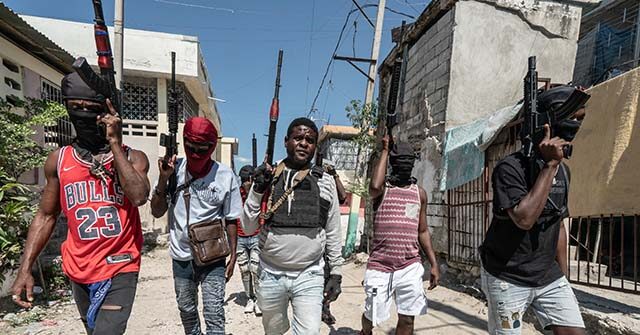The U.N. Security Council (UNSC) on Tuesday approved a U.S. proposal to add more personnel and funding to the security mission in Haiti, which has been overrun by violent gangs ever since the assassination of President Jovenel Moise in July 2021.
“This dramatic expansion of gang violence has jeopardized the very existence of the Haitian state,” said U.S. Ambassador to the United Nations Mike Waltz when introducing the proposal for an expanded mission to UNSC.
“This resolution offers Haiti hope. It is a hope that has been rapidly slipping away as terrorist gangs expanded their territory, raped, pillaged, murdered and terrorized the Haitian population,” Waltz said.
The vote to authorize the extended mission passed the Security Council, 12-0, with three abstentions: China, Russia, and Pakistan.
Russia and China criticized the U.S. for not doing enough to stop the flow of weapons to Haitian gangs, failing to provide enough funding for the security mission in Haiti, and presenting an ambiguously worded proposal to UNSC that was vague on key details.
“Let us be frank, if that contributor failed to provide the promised funds for the MSS, what guarantees are there that things will be different with this new mission?” said Russian Ambassador Vassily Nebenzia, needling the United States for spending billions of dollars to support Ukraine while ignoring the humanitarian disaster next door in Haiti.
“We have no certainty that the authors of today’s text will not come up with some kind of – quote, unquote – creative way to link their military activity to allegedly combating drug cartels,” Nebenzia added, implying that the U.S. might use the Haiti mission as cover to stage a military conquest of the island – or perhaps as cover for an invasion of Venezuela, which has been complaining about U.S. military strikes on its drug trafficking shipments.
Reuters reported on Tuesday that U.S. officials told UNSC that continued American funding for the mission to Haiti could not be guaranteed, unless the U.N. accepted the American proposal to upgrade the mission into a force that could actually fight the gangs and win.
The current Multinational Security Support (MSS) mission in Haiti is very modest, compared to the scale of the problem. Only Kenya was quick to respond to the call for volunteers, sending 400 police officers to Haiti in 2024.
The Kenyan deployment was subsequently increased, and currently stands at around 800 officers, with another 200 pledged for the future. Around 150 officers from Guatemala joined the mission in January.
The U.S. proposal would establish a new “Gang Suppression Force” (GSF) to augment the Kenyan-led MSS with up to 5,550 police officers. The GSF would be authorized to act more aggressively against Haiti’s large, vicious, and heavily armed gangs.
The proposal also called for building a U.N. support office in Haiti to handle “logistical and operational support” for the expanded effort. Critics of the Kenyan mission to Haiti, including Kenyans who believe President William Ruto lacked constitutional authorization to send the officers, complain that the Kenyan officers have been poorly fed, underpaid, and poorly utilized.
Ambassador Waltz envisioned “a mission five times the size of its predecessor and with a strengthened mandate to go after the gangs.” The proposal approved by UNSC on Tuesday did not specify when the additional forces would be dispatched to Haiti, or where they would come from.
Laurent Saint-Cyr, head of Haiti’s transitional presidential council, applauded Tuesday’s vote as “a decisive turning point in the fight against armed criminal groups that are causing grief for our families, paralyzing our economy and threatening the future of our nation.”
Read the full article here


